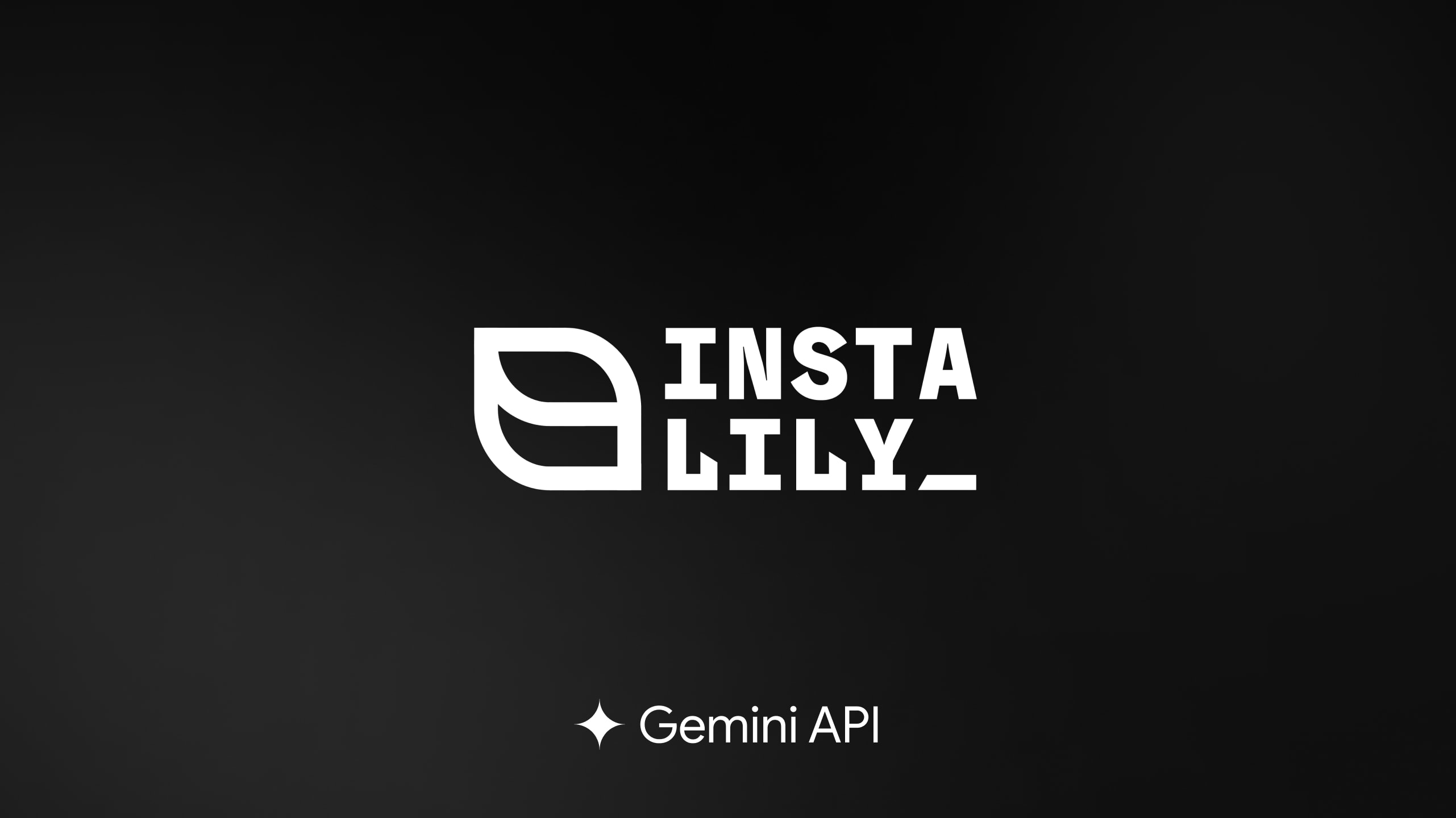16 ธ.ค. 2025
InstaLILY: มอบพลังของเอเจนต์ AI เฉพาะทางด้วย Gemini 3 และ Gemma ให้กับบริษัทต่างๆ

InstaLILY กำลังเปลี่ยนวิธีการทำงานของธุรกิจขนาดใหญ่ด้วยการสร้างเพื่อนร่วมงาน AI ที่มีความเชี่ยวชาญเฉพาะด้านซึ่งเป็นผู้เชี่ยวชาญในสาขาของตน InstaLILY ไม่ได้ใช้ AI แบบครอบจักรวาล แต่สร้าง "เอเจนต์ AI เฉพาะทาง" ที่เข้าใจความต้องการเฉพาะของการขาย บริการ และการดำเนินงานในระดับองค์กร
การจับคู่ความสามารถในการให้เหตุผลของ Gemini 3 Pro กับโมเดล Gemma ที่เฉพาะเจาะจงโดเมนทำให้ InstaLILY มอบพลังของ AI 2 ตัวในระบบเดียวให้กับบริษัทต่างๆ
พลังของ 2 สิ่ง: Gemini 3 สำหรับการคิดอย่างชาญฉลาด และ Gemma สำหรับการดำเนินการอย่างรวดเร็ว
InstaLILY ใช้ระบบ "ไฮบริด" ที่ไม่เหมือนใครซึ่งรวมโมเดล AI 2 ตัวอันทรงพลังของ Google เพื่อให้ได้ประโยชน์จากทั้ง 2 โมเดล
- Gemini 3 Pro สำหรับการให้เหตุผลเชิงลึก: นี่คือมันสมองทางเทคนิคของปฏิบัติการ โมเดลนี้จัดการการให้เหตุผลที่ซับซ้อน ตีความสถานการณ์ที่ยาก ตรวจสอบขั้นตอน และตรวจสอบว่าทุกอย่างสอดคล้องกับกฎและขั้นตอนภายในของบริษัท (จัดเก็บไว้ใน "หน่วยความจำขององค์กร" ที่เรียกว่า InstaBrain™)
- โมเดลภาษาขนาดเล็ก (SLM) ที่อิงตาม Gemma เพื่อประสิทธิภาพเฉพาะทาง: โมเดลเหล่านี้คือเอเจนต์ผู้เชี่ยวชาญ โมเดล Gemma มีประสิทธิภาพที่ได้รับการปรับแต่งมาอย่างดีสำหรับงานที่เฉพาะเจาะจงซึ่งเกี่ยวข้องกับโดเมน เช่น การประมวลผลไฟล์เสียงบันทึกขนาดยาวหรือการจัดประเภทคำขอของลูกค้าประเภทต่างๆ
การเป็นพาร์ทเนอร์ครั้งนี้ซึ่งขับเคลื่อนด้วยชิป TPU v5e ที่ Google ออกแบบมาโดยเฉพาะจะช่วยให้มั่นใจได้ว่าระบบจะทั้งฉลาดและรวดเร็วอย่างยิ่ง จึงมอบประสิทธิภาพระดับสูงได้ทันที
InstaLILY สร้างโซลูชันที่เปลี่ยนแปลงได้สำหรับกรณีการใช้งานต่างๆ ผ่านสถาปัตยกรรมระบบแบบเดียวกันแทนที่จะใช้โค้ดที่กำหนดเอง การติดตั้งใช้งานแต่ละครั้งจะใช้เลเยอร์ตัวเชื่อมต่อเดียวกันสำหรับการเข้าถึงระบบปฏิบัติการที่มีโครงสร้าง, สารตั้งต้นหน่วยความจำขององค์กรที่แก้ไขได้เดียวกัน (InstaBrain™) ซึ่งสร้าง SLM แนวตั้ง และเลเยอร์ตัวแทนที่ประสานงานเดียวกันซึ่งมีการกำหนดมาตรฐาน ควบคุม และเป็นระดับองค์กร
ซึ่งจะช่วยให้คุณทำสิ่งต่อไปนี้ได้
1. ข้อมูลเชิงลึกแบบเรียลไทม์ในภาคสนามสำหรับทีมขายและทีมบริการ
ช่างเทคนิคภาคสนามและตัวแทนฝ่ายขาย โดยเฉพาะพนักงานใหม่ มักประสบปัญหาในการเข้าพบลูกค้าที่ซับซ้อนซึ่งใช้เวลาหลายชั่วโมง โดยต้องปรึกษาคู่มือด้านวิศวกรรม ทำตามขั้นตอนการวินิจฉัย และตรวจสอบการปฏิบัติตามกฎด้านความปลอดภัยและราคาด้วยตนเอง ซึ่งทำให้เกิดความล่าช้าและบริการที่ไม่สอดคล้องกัน การใช้ InstaLILY ช่วยลดระยะเวลาการฝึกจาก 120 วันเหลือเพียงกว่า 1 เดือน
เอเจนต์ใช้ Gemma เพื่อประมวลผลเสียงจากการเข้าชม ขณะที่ Gemini 3 ทำหน้าที่เป็นเครื่องมือตรวจสอบข้อเท็จจริงแบบเรียลไทม์ที่ตรวจสอบทุกขั้นตอนการตรวจสอบและยืนยันการปฏิบัติตามขั้นตอนทั้งหมด ตอนนี้ผู้จัดการใช้เวลาเพียง 10 นาทีในการตรวจสอบการนัดหมายที่ใช้เวลาหลายชั่วโมง และคะแนนการปฏิบัติตามขั้นตอนการปฏิบัติงานมาตรฐานและความปลอดภัยเพิ่มขึ้นจาก 50% เป็น 90%
2. การกำหนดเส้นทางเคสอัตโนมัติสำหรับการดำเนินงานด้านโลจิสติกส์และการจัดส่ง
ทุกเดือน บริษัทต่างๆ จะจัดเรียงเคสด้านโลจิสติกส์ด้วยตนเองหลายหมื่นเคส (เช่น ปัญหาการจัดส่ง การเปลี่ยนแปลง) โดยใช้ระบบที่ล้าสมัยและคู่มือที่ซับซ้อน
ตัวแทนของ InstaLILY ลดปัญหาคอขวดและคิวที่ยาวด้วยการใช้ Gemma เพื่อระบุประเภทเคสและดึงรายละเอียดที่สำคัญได้อย่างรวดเร็ว ในขณะเดียวกัน Gemini จะตีความตรรกะการกำหนดเส้นทางที่ซับซ้อนและแก้ไขข้อยกเว้นโดยอัตโนมัติ การนำขั้นตอนที่ช้าและเป็นลำดับออกช่วยให้ระบบลดเวลาในการประมวลผลเคสจาก 15 นาทีเหลือ 3 นาที
3. การเร่งการเสนอราคาสำหรับผู้จัดจำหน่ายและซัพพลายเออร์ในอุตสาหกรรม
ซัพพลายเออร์ชิ้นส่วนและผู้จัดจำหน่ายอุตสาหกรรมได้รับคำขอใบเสนอราคาผ่านช่องทางที่ไม่มีโครงสร้างและไม่เป็นระเบียบ ซึ่งรวมถึงอีเมล การสอบถามแบบข้อความอิสระ และไฟล์ PDF การจัดเรียง ตีความ และตอบกลับคำขอเหล่านี้ด้วยตนเองใช้เวลา 5-6 วัน ซึ่งมักจะทำให้พลาดโอกาสในการขาย
InstaLILY ใช้ Gemini 3 Pro เพื่อตีความวัตถุประสงค์ของลูกค้าจากเอกสารที่ไม่มีโครงสร้าง และแก้ไขตัวระบุผลิตภัณฑ์ที่สับสน Gemma จะจัดประเภทคำขอและร่างคำตอบโดยอัตโนมัติ เมื่อผสานรวมกับระบบสินค้าคงคลังและ ERP แล้ว ตัวแทนจะสร้างใบเสนอราคาแบบเต็มได้ในไม่กี่นาที เวลาในการดำเนินการที่เร็วขึ้นช่วยเพิ่มรายได้ประมาณ 10%
"องค์กรไม่จำเป็นต้องมีโคไพลอตทั่วไป พวกเขาต้องการเอเจนต์ AI ที่เข้าใจอุตสาหกรรมของตน ปฏิบัติตามกฎ และทำงานด้วยความเร็วตามที่เวิร์กโฟลว์ต้องการ Gemini 3 และ Gemma เป็นรากฐานให้เราสร้างเอเจนต์เฉพาะทางที่ทำงานได้อย่างชัดเจน สม่ำเสมอ และเชื่อถือได้ตามที่ทีมระดับองค์กรที่สำคัญต่อภารกิจคาดหวังตั้งแต่วันแรก"
ยุคใหม่ของ AI สำหรับองค์กร
การผสานรวมความสามารถในการให้เหตุผลที่ซับซ้อนของ Gemini 3 Pro เข้ากับความเร็วเฉพาะด้านของ Gemma ทำให้ InstaLILY มอบสถาปัตยกรรมระดับองค์กรที่ให้ประสิทธิภาพระดับสูงอย่างแท้จริง ซึ่งนำมาสู่การเปลี่ยนแปลงครั้งใหญ่ในด้านบริการภาคสนาม โลจิสติกส์ และการจัดจำหน่าย
หากต้องการเริ่มสร้างด้วยโมเดล Gemini และ Gemma โปรดไปที่ Google AI Studio และอ่านเอกสาร API




